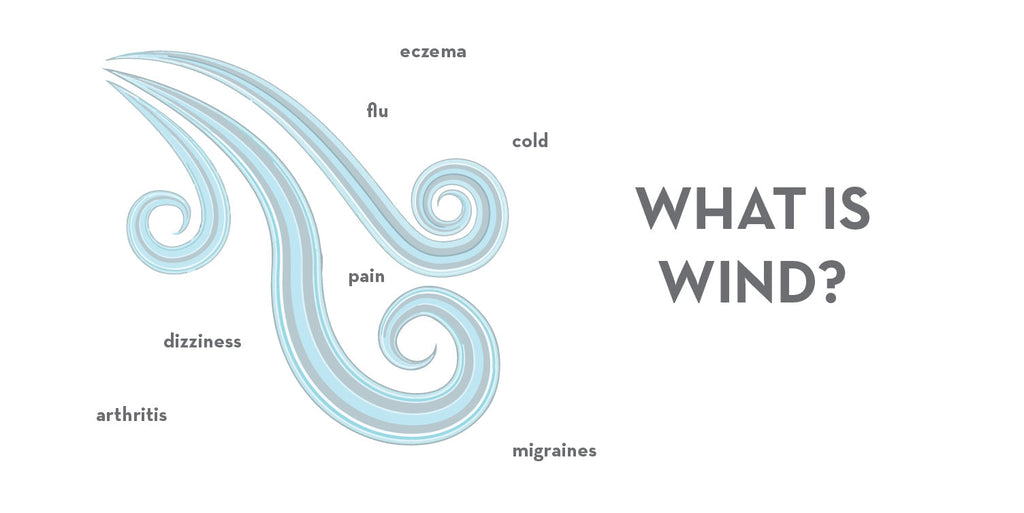Most of us know how it feels to have our faces slapped by a strong wind, or the eerie sensation that arises when it howls so loudly and violently that the whole house shakes. But we also know the pleasure of a soothing breeze on a hot day. Wind in and of itself is not some inherently evil spirit as some may suggest; its impact depends upon the constitution and resiliency of the landscape through which it blows. And, like anything, the value we assign to it depends on the scope and slant of our perspective.
HUMANS AS NATURE
In the ancient metaphysics which inspire and permeate Chinese Medicine, human beings are understood as elements and incarnations of the Natural World. We are a microcosmic embodiment of the Earth, and by extension, the entire Universe.
The patterns that transpire in the human body parallel and resonate with those that exist in nature. All forms of being on Earth are simply unique manifestations of one universal Qi, the “substratum of the cosmos,” the essential quality of being and evolving. Due to this shared resonance, humans are easily influenced by the “outside” world, and vice versa. One might say they mirror or mutually engender one another. Rather than a linear model of cause and effect, Chinese Medicine explains this synchronicity of phenomena through a system of correspondences in which cause is the effect.

From this vantage point, we can better understand the language used in Chinese Medicine to elucidate health and disease. States of illness are akin to patterns of poor weather in the landscape of our bodies, and are named as such. Often our disharmonious internal climate resembles the current external atmosphere, in which case we might say that we have been impacted by an External Pernicious Influence, such as Wind, Cold, and Dampness. These influences can both designate “cause” of disease, and serve as names for patterns of stress in the body.
WIND AND DIS-EASE
The most virulent of the climatic forces that provoke disharmony in the human body is Wind. It, like all the External Pernicious Influences, is seen as both an influence, as well as a manifestation of disease; the “cause” and the effect. Wind is considered the “spearhead of all disease”, for it serves as a vehicle to carry other undesirable Influences into the body; yet, it’s worth noting, that with a shift in perspective, Wind can also be regarded as the spearhead of all growth.
A disorder that Western Medicine deems unexplainable may be thought of as a Wind condition in Chinese Medicine. Wind can “invade” the body from the outside (“External Wind”), predominantly disturbing the Lung Qi; or be generated internally (“Internal Wind”), where it primarily agitates the Liver Qi. When we are vulnerable, External Wind often penetrates the body through the back of the neck, so wearing a scarf and staying bundled up in windy weather can help keep us well. Once external factors, like wind, are believed to influence the body, herbal formulas such as Cold Season Solutions by DAO Labs, along with acupuncture, are traditionally used to support the body’s natural balance and promote wellness.

Wind is considered a contributing factor in conditions related to:
- Sudden onset or rapid changes, such as acute discomfort (e.g., cold or flu-like symptoms)
- Uncontrolled or excessive movement
- Migratory symptoms, such as joint discomfort
- Skin imbalances, such as occasional rashes or irritation
- Dizziness or lightheadedness
- Discomfort or tension
- Areas of the body like the face, skin, or upper respiratory system
- Nervous system challenges, as seen in conditions like occasional neurological disturbances
- Emotional fluctuations, including impulsive behavior
THE WINDS OF CHANGE
As the emblem and instigator of Change, Wind is a constant force in our existence - one we habitually respond to in an effort to maintain balance. Our perception of its motive - as invasion or invitation, the nature of our response, and our internal landscape, accounts for any symptoms that may arise.
Our internal milieu, including immune health, as well as our relationship to change and chaos, influences how Wind affects us. When our defenses are compromised or we insist on control, Wind’s penetrating, capricious, urgent nature renders us more susceptible to its fickle threat.
Care Consideration: Just a reminder that the above information is not a substitute for medical care and is not a substitute for medical advice or recommendations from a healthcare provider. This information is not intended to treat, mitigate, or cure any disease. That said, we encourage you to connect with an Acupuncturist in your community to learn more about this and other Traditional Chinese Medicine options. If you’ve got questions about Chinese herbal medicine or getting started with an Acupuncturist, feel free to connect with us at hello@mydaolabs.com.
















